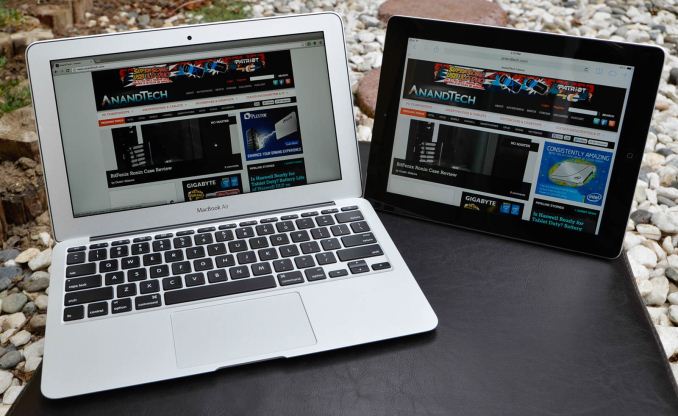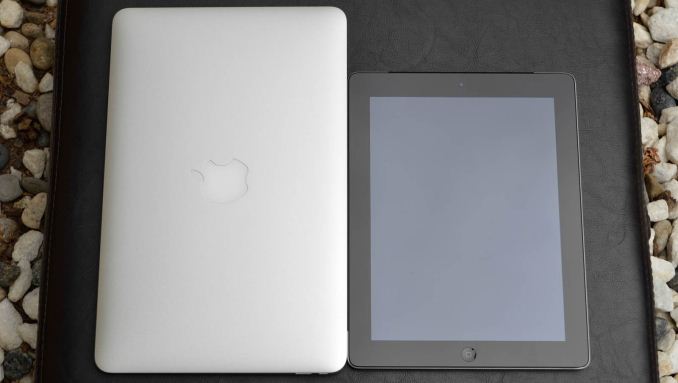The 2013 MacBook Air Review (11-inch)
by Vivek Gowri on August 9, 2013 1:45 AM ESTSince the last time the iPad versus MacBook Air 11” comparison was brought up, both products have improved and evolved tremendously, the iPad more so than the Air. It’s easy to dismiss even making the connection (because who here actually cross-shops a high-end ARM tablet with a mid-range ultraportable, raise of hands please) but I think there are enough shared attributes to make a discussion worthwhile, especially considering the similarity in terms of form factor and now battery life. If I was looking for an extremely compact, thin, light, and long-lasting companion device to bring on a trip, they’re both completely valid answers. But which would I actually take?
The short answer would almost always be the Air, for a variety of reasons, but I’ll get there. This basically goes back to the tablet versus notebook conversation for various usecases. The iPad is awesome as a travel device, as are most tablets in general, and you can see evidence of this in any airport terminal. Especially after the screen upgrade last year, the iPad is hands down one of the best content consumption devices on the market. It’s also my absolute favorite digital platform for reading. I’ll actually save lengthy articles, like some AnandTech reviews and other long-form content from other websites I enjoy, to read on my iPad. Between the sharpness of text on the Retina display and the physical closeness you have with the words, it’s about the closest you can get to a paper reading experience on an LCD. (This also holds true for any high-DPI tablet, including the Nexus 7.2, Nexus 10, Surface Pro, and others). Also, the ability to use a tablet with only one hand, not needing a platform of some kind, and general versatility of physical handling adds a convenience factor that’s hard to get from a notebook.
But when the tablet doesn’t have an inherent advantage in terms of size or battery life, it’s a lot harder to justify skipping the sheer versatility and power you get out of a real notebook computer, even a small one, for reasons that amount to the tablet being easier to use while standing up. The notebook is basically better at everything other than reading, and there’s far more computing horsepower at your disposal. You have far more control over everything that happens—media, browsing, documents, you name it. And there’s a real, physical keyboard, so in terms of productivity, there’s just not a conversation. To some degree, that’s always been something that held tablets back for me and I suspect the other editors on staff. Admittedly, our usecases typically involve a lot of writing and email, neither of which is easy at all without a hardware keyboard, so we’re probably not the right target demographic to judge tablets by.
The capabilities of a Core i5-based ultraportable are so far beyond that of an iPad or Nexus 10 though, which is part of what makes this on the surface a somewhat odd comparison to be making. Obviously the tablets are cheaper, though it’s worth pointing out that a 128GB iPad (WiFi) is only $200 less than a 128GB Air 11”, and as noted earlier the iPad keyboards typically run $100. I don’t know why anyone would need that much storage on an iPad, maybe if you had a ton of 1080p video content that you really needed to carry with you everywhere. The 16 and 32GB iPads, at $499 and 599, are obviously far more accessible and probably more sensible investments.
I’m not trying to recommend that people buy the Air over the iPad, just that it’s possible to do so with very little compromise. It wasn’t really something you could do until now simply because of battery life, but with Haswell ULT boasting similar or better power efficiency than high-end ARM SoCs in light everyday CPU-driven workloads, it’s certainly something to think about. I think the best of both worlds situation is yet to come, possibly with something that looks like a thinner, Haswell-based Surface Pro with Windows 8.1 and significantly better battery life than we’ve seen out of Ivy Bridge tablets in the last year.












139 Comments
View All Comments
DigitalFreak - Friday, August 9, 2013 - link
"Higher screen res typically comes at the expense of poorer battery life. Apple simply made a judgement call to prioritize PROFIT over everything else. I don't see that as an inherently bad thing."solipsism - Friday, August 9, 2013 - link
And yet they've been pioneers to add high-density displays to nearly their entire line when most people on this site were saying how pointless it was. It's apparently more difficult than you give it credit or the Samsung Ativ Book 9 wouldn't be considerably higher priced than a comparably specced MBP.DesktopMan - Saturday, August 10, 2013 - link
Displays aren't actually very expensive. Look up retina screens on eBay. Samsung is charging that because they think they can, not because they have to. IMO the Ativ Book 9 is priced too high for success.ananduser - Saturday, August 10, 2013 - link
Cut the crap with the "pioneering" please. They only provided the first leak of a pissing contest in display panels. Sony's quantum dot tech present on their Vaios is pioneering, the iphone was pioneering; paying Samsung/LG to provide you high res panels is NOT pioneering.solipsism - Saturday, August 10, 2013 - link
Sure it is. Investing in a technology that a vendor saw no route for monotizing is moving technology forward. History has shown that it's not enough to simply have created a technology but you need to have an application that can effectively utilize it. Just within the the recent years of Apple we've seen Intel dust off their SFF ULVs to make them the basis of an entirely new Ultrabook™ brand under Intel, we've seen Corning retrofit a factory to make alkali-aluminosilicate sheet for the original iPhone that they then branded as Gorilla Glass® despite their CEO reportedly telling Steve Jobs it could not be done, we've seen Apple become in the most profitable handset vendor in the world in a little over a year of reaching the market despite claims from Blackberry (nee Research In Motion) that the iPhone OS couldn't be that smooth as well as the entire industry moving to a multi-touch capacitance touchscreen.What's amazing is that you could claim that none of those involve new ideas or methods which means that even Google hasn't pioneered search, email, other web-based apps, and ad placements simply because they all existed in some rudimentary and less useful ways prior to Google's involvement.
ananduser - Saturday, August 10, 2013 - link
You went way overboard. I did credit the iphone. There is nothing pioneering in being the first to fit a high res display in a laptop or a high res display in a smartphone(Sony and Sharp). It's like being the first to make a carbon fiber laptop, it's not pioneering.solipsism - Saturday, August 10, 2013 - link
Yes, it is pioneering to be able to source components (which you often invest heavily in years prior) that you then mass produce before anyone else. You can claim all you want that Sony demoed or shipped a smartphone in Japan with more pixels or a higher PPI at CES before Apple released the iPhone but that isn't exactly pioneering in the way Apple has. You clearly think that being "First!" is somehow more relevant than being feasibly priced, efficiently produced, of high quality, or mass marketed. You really need to look at the big picture of what is involved from the start to getting into the hands of consumers.fluxtatic - Sunday, August 11, 2013 - link
Pointlessly, it seems - 8 -> 11 hours makes a lot less impact than 5 -> 8 hours. There's no way in hell I'd pay over $1k for a laptop with a 1366x768 TN display. There's no excuse for that.KPOM - Friday, August 9, 2013 - link
I've long been a fan of the 11" MacBook Air, but after having used a 13" rMBP for the past few months I likely won't go back to the Air until it gets a Retina display. Hopefully that comes in 2014. Since OS X doesn't scale as well as Windows 8, we won't get a 1080p "compromise." It will either be 1366x768 or 2732x1536 next year.I prefer the form factor of the 11". The 13" rMBP weighs over 50% more, and it doesn't fit into iPad pockets or front pockets of briefcases/notebook cases the way the 11" Air does. I've heard rumors that the 13" rMBP will be made a bit thinner, but maybe what that means is that in 2014 the 13" Air and rMBP lines are merged. We'll get a better sense of Apple's direction when they release the Haswell rMBPs this fall.
wendoman - Friday, August 9, 2013 - link
> iPad versus MacBook Air 11” But which would I actually take?Surface Pro 2 with Haswell.